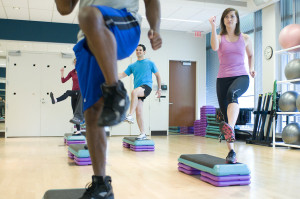 I attend aerobic dancing classes two mornings a week (on average) at the Pergola Mall in BF Paranaque. I love it because, if there is one example of non-pharmacological intervention against cognitive decline, this class is it! Our teacher, Mel Aurelio, is the best teacher ever. He has many years of experience teaching aerobics. He has competed overseas (e.g. World Aerobics Championship in Perth W. Australia) and attended conventions as well (e.g. Orlando Fla. International Dance Exercise Association of America). In addition, he has degrees in Psychology and Nursing.
I attend aerobic dancing classes two mornings a week (on average) at the Pergola Mall in BF Paranaque. I love it because, if there is one example of non-pharmacological intervention against cognitive decline, this class is it! Our teacher, Mel Aurelio, is the best teacher ever. He has many years of experience teaching aerobics. He has competed overseas (e.g. World Aerobics Championship in Perth W. Australia) and attended conventions as well (e.g. Orlando Fla. International Dance Exercise Association of America). In addition, he has degrees in Psychology and Nursing.
His classes may look like regular aerobics dance classes but he actually has reasons behind the movements he gives in the class. The most apparent is that the movements we do make us sweat, increase our heart rate and warm up our muscles and joints. The less obvious is that learning several combinations quickly and in succession forces us to pay attention and focus. This is actually cognitive stimulation tapping our working memory, attention and mental discipline (not allowing irrelevant thoughts interfere). Mel always admonishes us to think only of our dance combinations during the 1 hour we have together (“An hour of pure focus”).
I always feel great at the end of the class. I not only feel that my body got a great workout, I also feel that my mind is clearer, quicker and more alert! Not to mention, the endorphins kicking in and I feel very cheerful, happy and re-energized ready to face the world again! This is actually meditation in motion and a very good way to fight cognitive decline.
Mel also recommended several exercises to keep the mind active. One such is to do brisk walking about 15 to 30 minutes while doing serial subtraction (e.g. 100 minus 3 or 100 minus 7). For persons with Alzheimers Disease (AZ), he also recommend doing vocal exercises such as saying “ah-eh-ooh” and “mama-papa-kaka”. He also said that balanced and healthy nutrition also plays a vital role in maintaining good cognitive functioning (e.g. like vitamins A, C and the B complexes). Deep and restful sleep is also another important factor that helps maintain our mental functioning!




